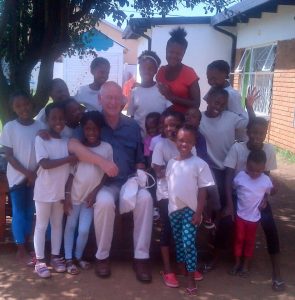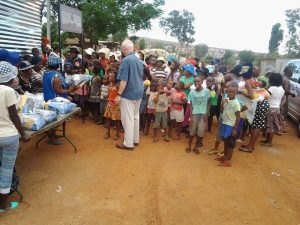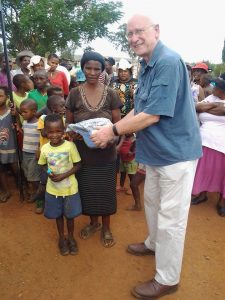In Johannesburg, January 2016, I saw charity, business and community working together for the most deprived…
Moriteng and Finetown are squatter camps on either side of the main road into Ennerdale, south of Johannesburg. In this community in 2004 the British Lisa Ashton met a local woman, Winnie Mabaso; this was where Winnie had spent her life protecting vulnerable young girls (often orphans, often infected with HIV from birth), not least from predatory older men. In the local culture sex with a virgin is wrongly regarded by some men as a way of protecting themselves against HIV. Months later, after Winnie had died, Lisa pledged to continue her work through the Foundation she established in Glossop, Derbyshire. From 2013 she committed herself to the task on a full time basis from the United Kingdom.
Ten years ago the facilities consisted of a community building alone, now the Zinzele Centre; in January 2016 I visited the new Ilamula House orphanage, founded in 2014 and home, when at full capacity, to 22 girls from the two camps. One of the oldest residents, Nomthandazo, was three when she was photographed with Lisa and Winnie at the time of Lisa’s first visit. Now she’s 14, a mature, confident, responsible and polite young lady, and the photo still adorns the orphanage wall.
Ilamula means lemon in the local language and the lemon motif can be found throughout the clean, tastefully decorated but intimate building. Girls share dormitories with 3-5 others of similar age and the mostly female staff who feed, clean, administer and otherwise support the programme are engaged, supportive and caring without exception. Helga, a local and a former social worker, ably runs the orphanage assisted by Amanda.
The orphanage admits girls aged 2 to 14 and they will remain in the Foundation’s care for as long as necessary. Those who are of age attend the local school. Some of the girls have additional music lessons, some dance, some opt for taekwondo.
A few of the children have additional needs; one is deaf and uses basic sign language. One of the youngest is three, abandoned in hospital at a few months old, suffering from epilepsy and antibiotic-resistant tuberculosis, transferring to the orphanage a year later. The drugs that control her HIV positive status appear to keep the TB at bay. Despite her moderate learning difficulties she is thriving.
The orphanage grows much of its own food in its modest grounds – beetroot, spinach, tomato, aubergine, maize, pumpkin – and the girls tend to the resident chickens. No one forgets where the girls have come from: twice each week the older ones help to deliver hot food to the two nearby squatter camps.
On the day I was there, the meal was rice with lentil soup. Three large, hot, cooking pots in the back of a minibus were taken to three locations in turn in the 20-year old Moriteng camp, home to 500 people living in tin shacks. The older orphanage girls, connecting with their past, assisted in handing out food to the younger and workless beneficiaries. The population lives on land they do not own (hence ‘squatter’) but they are fortunate: the owner is the local authority, which has provided the camp with three sets of community water taps and a self-contained toilet hut on each property. Although there is a rudimentary ‘informal’ electricity supply (powering a couple of ghetto blasters, as far as I can see) a more reliable supply might be installed in the near future…
Each tin hut sits in its own paddock delineated by wire, sometimes by the skeletons of old mattresses; following fire accidents the Foundation has recently replaced several homes with new ones, also single-room corrugated iron structures. I was shown around two of these by residents Marie and Dorothy, two of the oldest women in the camp. Each lives alone, proud of their new homes and their new vegetable patches, though other shacks are home to families of up to six. Between the huts small peach trees are found, their fruits shrivelled by a prolonged and hot drought in the middle of what ought to be the rainy season.
Back in Glossop Lisa has persuaded a local company, Fluorochem, to pay for school uniforms for the children of the camps. Without a uniform – so often one of the proudest possessions of African village families – children cannot attend school. Nomthandazo tells me she wants to be a doctor when she grows up. So, as I help distribute the uniforms to children and parents, each couple posing for a photograph, I am very aware that the gift is a real route to potential liberation. More discretely, the Foundation has started to provide 200 post-pubertal girls with re-useable sanitary pads. This enables them to attend school for four weeks out of every four instead of three, as previously. Another act of liberation.
Each week the Winnie Mabaso Foundation asks camp residents about their needs. They provide them with seeds, gardening skills, lifts to appointments, advice on school admissions and more. Most residents are not working – largely children and the elderly – but, even for many of those that do work, long hours of domestic service minus travel costs is no panacea. South Africa has minimum wage legislation only in some ‘vulnerable’ sectors, including domestic service, but the rate varies by sector and locality so is difficult to monitor and enforce.
The Foundation also supports enterprise: mountains of squashed plastic bottles identify a new recycling business – they are collected from Ennerdale, Finetown and Meriting, roughly sorted and baled, then sold on. A vegetable garden of commercial scale is being considered and they have recently erected a new church building – which looks very like a slightly larger version of the gleaming tin shacks which are people’s homes. Only its external signage and internal benches distinguish it.
Food alone, for the camps rather than the orphanage itself, costs the Foundation thousands of Rand each month and reliable sources of funding are always being sought. Charities have their own agendas and compete with each other for funding; government has little cash to spare and rich foundations are few and far between. Business is thus a natural resource for places like Ilamula to look for support but there is competition for corporate philanthropy. For this reason the Derbyshire link is a vital lifeline: ‘We’ve been on High Peak Radio,’ one girl told me, proudly, ‘twice’.
The circumstances of Moriteng and the Ilamula orphanage are not going to change significantly any time soon. The girls’ friends in UK will keep them afloat; there are no plans to expand. But more broadly the delicate nature of the South African economy, the competition for employment with migrant labour that challenges squatter camp residents, the inability of government bureaucracy to force real change and the limits to the capacity of charities to grow public support significantly (either locally or internationally) all point to an uncertain future for South Africa’s community, its institutions and the nation as a whole.
South Africa has left a dismal, harsh and destructive past behind but its vision for the future is unclear – still apparently defining it as what it will not be – and it is walking a tightrope between the two points which define this journey. Tightropes are precarious places to walk; let alone to deliver services or a future to vulnerable adults and children.
Meanwhile, Ilamalu and the Winnie Mabaso Foundation are doing their best. ‘Mabaso Love’ works.